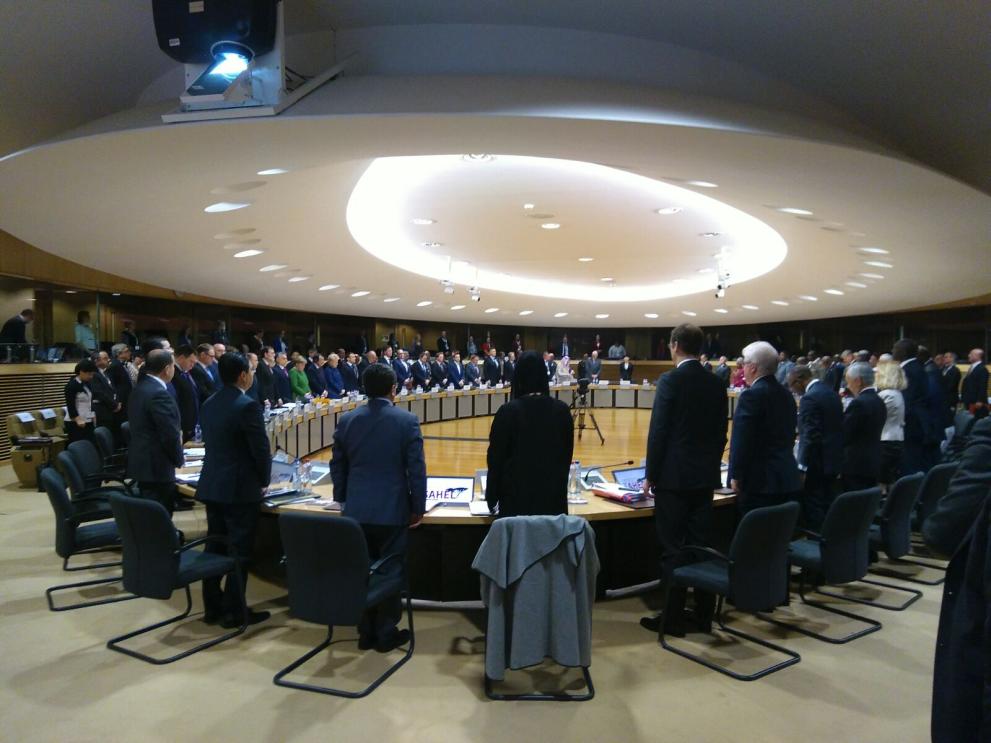
The International High Level Conference on the Sahel has mobilised a total of €414 million to support the G5 Sahel Joint Force, which aims at increasing security in the region. The EU announced a doubling of its own support, to €100 million.
For the first time, 32 leaders from all over the world gathered in Brussels to support the G5 Sahel countries: Burkina Faso, Chad, Mali, Mauritania and Niger. Over 60 delegations, including EU countries, the African Union, the UN and other partners like Japan or Canada, took part in the conference, held at the Berlaymont on Friday.
In his opening remarks, President Juncker pointed out that one-fifth of the population in the area currently suffers from food insecurity, and that crises and conflicts have displaced about 5 million people. He also stressed the impact of climate disorders in the region, as well as the lack of jobs for young people and significant migratory movements.
"Security and development must go hand in hand. To do so, we must continue to mobilise all the instruments we have at our disposal. The EU has doubled its support to €100 million to reinforce the operationalisation of the G5 Sahel Joint Force and I am proud that all our friends and partners of the Sahel joined us in these efforts," he said.
HR/VP Mogherini stressed the impressive political mobilisation achieved at the event, and the fact that the total funding has gone well beyond initial expectations. Out of a total of €414 million for the Joint Force, €176 million will come from the EU and its Member States.
She also spoke of the Coordination Hub established by the EU to channel the offers of international support to the G5 Joint Force. Already operational, it matches the offers of donors with a recognised list of the needs of the Joint Force, which includes troops from all five Sahel countries.
The European Commission President Jean-Claude Juncker stated "The EU is the first partner of the Sahel. We want to help the region to be safer and provide opportunities for the future of its people, especially the youth. To achieve this, together, we must make security and development go hand in hand, one can't happen without the other".
Issoufou Mahamadou, President of Niger and the current chair of the G5 Sahel, referred to the measures already taken by these five countries to make the Joint Force operational. For example, Niger has allocated 15% of its budget to security.
He stressed the need to find a permanent solution for financing the Joint Force, which after the first year will require a yearly budget of around €115 million to continue the fight against terrorism and organised crime. He also highlighted the importance of stabilising the situation in Libya, a root cause of the security degradation in the Sahel.
On behalf of the African Union Commission, its chairperson Moussa Faki Mahamat welcomed the outcome of the conference but called for an even bigger mobilisation of the whole international community, as was done for Syria and Iraq. He stressed that the five Sahel countries together have a territory of over 5 million square metres and more than 28,000 kilometres of borders to secure.
The G5 Sahel was set up in 2014, to foster cooperation in the region and tackle common challenges from poverty to terrorism and human trafficking. Since then, the EU has stepped up cooperation with this initiative on different fronts.
The EU already provided an initial €50 million for the creation of the G5 Sahel Joint Force. The funding, under the African Peace Facility, can only cover non-lethal equipment. It also has three ongoing missions in the region, one in Niger and two in Mali. They support the security forces of those countries with expertise and training.
The EU, together with its Member States, is the biggest provider of development assistance to the region, with €8 billion for the period 2014-2020. Notably, €843 million has been committed so far under the EU Emergency Trust Fund for Africa, which seeks to address the root causes of irregular migration.
The EU is also a member of the Alliance for the Sahel, launched last year to coordinate and deliver aid faster and more efficiently in the region.
As for humanitarian aid, the EU is also one of the largest donors to the area, including Nigeria and Senegal. Last year, the Commission allocated €234 million, with over €90 million for food assistance, nearly €57 for nutrition, and €22.5 for health. The EU also supports disaster risk reduction initiatives.
In 2017, over 1.9 million vulnerable people received food assistance thanks to EU support and about 455,000 children were treated for malnutrition.
Details
- Publication date
- 23 February 2018
